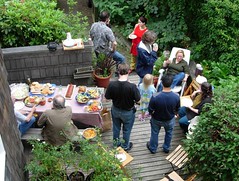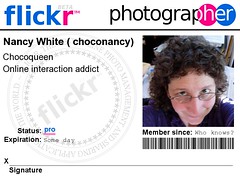Turning the Mirror Back to Me
Getting into the introspection phase now. In a conversation over tea with Lilia and Bev, they reminded me of another perspective about Blogher. There were parts of it that played into the us/them. This was present at moments in Blogher. The Flame, Blame, Shame and the A list conversations had those "us against them" flavors which I was just criticizing. So easy to point. Harder to turn the mirror back to myself/ourselves. Food for thought. What would I do without my friends to help me think better, more deeply and with more perspective? I'd be lost.
Just a note to those pulling one line out of my transcripts to make their point. Please, read and quote bigger segments to give the context. I'm seeing lots of pointers to lines that on their own mean something very different than the fuller context. Call me on my myopia as well. I'm ready. That's also why I'm posting my thinking in quick, but sometimes undigested bits this morning.
Really, TIME FOR BREAKFAST!
Categories: blogher, bloghercon,





















